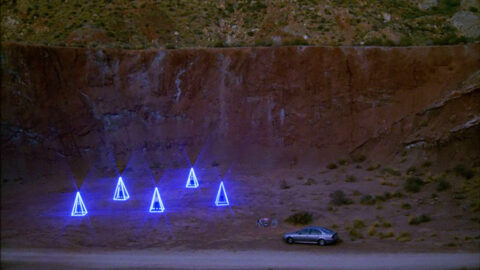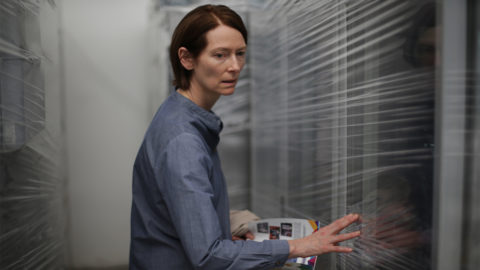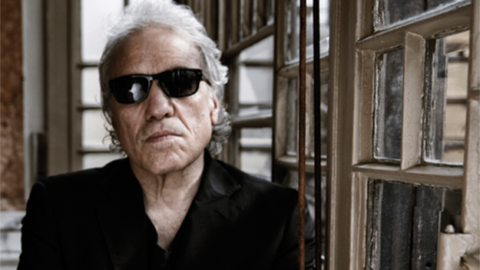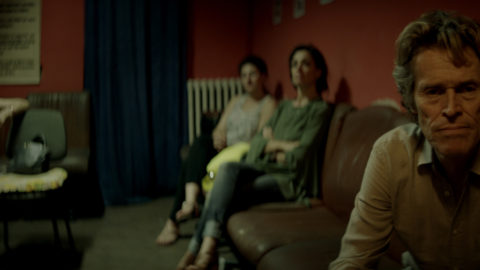Locarno 2021: Mass Appeal
This article appeared in the August 19 edition of The Film Comment Letter, our free weekly newsletter featuring original film criticism and writing. Sign up for the Letter here.
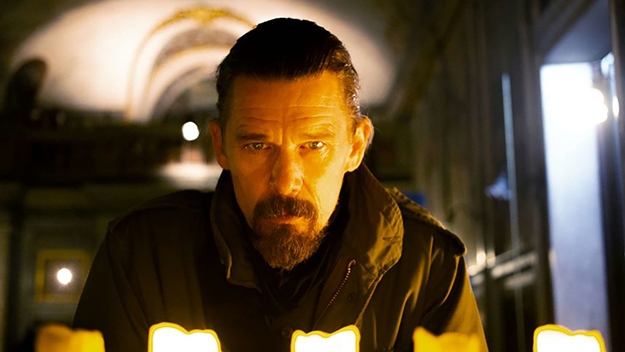
Zeros and Ones (Abel Ferrara, 2021)
With its third new director in four years, the Locarno Film Festival has been in a state of near-constant transition. Following the abrupt departure last September of previous head Lili Hinstin, the festival quickly hired Swiss-Italian critic and curator Giona A. Nazzaro to oversee its 74th edition. Vowing, per two recent interviews with Variety, to take Locarno in a more “audience-friendly” direction in an effort to “broaden the moral imagination” of the festival, Nazzaro appears to have a vision more in line with what the organization’s executives have long sought. What that has meant in practical terms is the elimination of the Moving Ahead section, a program for artists’ cinema, and the promise of more accessible work (i.e. genre films) in the Competition and Filmmakers of the Present strands. Having viewed all 32 features across the two sections, I can confirm the presence of many genre-oriented productions, though the designation sells short the scope and diversity of past editions—this is, after all, the festival that recently launched La Flor (2018), a six-part, 14-hour film that redrew the bounds of genre storytelling itself. While a number of dubiously commercial selections filled out this year’s program, which was presented simultaneously in-person and online to accredited press (I opted for the latter option), three films continue in this more adventurous lineage, and together point most productively to a way forward for a Locarno that caters to both cinephiles and the masses.
In Vengeance Is Mine, All Others Pay Cash, winner of the festival’s top prize, the Golden Leopard, Indonesian director Edwin pays tribute to the Southeast Asian action and exploitation films of the 1980s. Based on a book of the same name by Eka Kurniawan (who also co-wrote the screenplay), the film applies the risqué humor and hyperstylization familiar to movies from the director’s youth to a story that critiques the same era’s overly masculine mores. The setup is simple but engaging: Ajo (Marthino Lio), a low-level thug, suffers from erectile dysfunction; to make up for his inadequacies, he picks fights in macho displays of virility. When, in an outrageously staged fight scene at a construction site, he gets his ass kicked by Iteung (Ladya Cheryl), the female bodyguard of a local crime boss, he meets his match in more ways than one: the two fall in love and get married, impotence be damned. Vengeance certainly isn’t the first film to conflate limp dicks with stiff fists, but it is one of the few with a notably reflexive dimension. Largely foregoing sensational violence, Edwin instead focuses on relationships, world-building, and backstory—elements that add to the film’s humorously convoluted web of intrigue. When Vengeance does hit the inevitable action beats, the visual effects are practical and effective, lovingly reminiscent of the days of hands-on choreography and actual, physical set pieces. A satisfyingly left-field choice for a major festival prize, the film sidesteps the old “style versus substance” dichotomy to offer a constructive example of how one can work in concert with the other.
Winner of the Best Director prize, Abel Ferrara’s Zeros and Ones is a psychodramatic missive in the guise of a political thriller. Starring Ethan Hawke in a dual role as the twin brothers JJ, an American soldier in Rome, and Justin, an imprisoned revolutionary, the film employs the Covid-19 pandemic as an allegorical framework through which to examine a more ambient form of social unrest. Arriving by train to a locked-down Rome, JJ is immediately swept into a terrorist plot to blow up the Vatican involving Justin (seen in a mysterious hostage video), Chinese gangsters, Muslim noblemen, and the Russian secret service. Like much in this eerily atmospheric film, JJ’s motivations are never spelled out; what seems at first a mission to rescue his brother soon takes on elements of espionage and the kind of questing spirituality that Ferrara has long trafficked in. An incendiary late-career work in the mold of Jerzy Skolimowski’s Essential Killing (2010) and Michael Mann’s Blackhat (2015), the film is at once streamlined and opaque, its murky nocturnal images—shot on video by cinematographer Sean Price Williams—further shrouding the narrative in layers of digital abstraction. As much a reflection of pandemic-era anxieties as a postmodern gloss on genre conventions, Zeros and Ones pushes Ferrara’s impressionistic tendencies further than anything he’s made in years.
Medea, Russian director Alexander Zeldovich’s first feature in 10 years (and only fourth in three decades), was the best film in Locarno not to win a prize, though that’s hardly surprising given its daring mix of ancient myth and modern existentialism. Set in present-day Israel, this update of the eponymous Greek tragedy stars Tinatin Dalakishvili as Medea, an emotionally tormented Russian chemist who kills her corrupt cop brother and relocates to Jerusalem to be with her married millionaire lover (Evgeniy Tsyganov). When their relationship splinters, Medea seeks solace in sex and religion, competing impulses she’s unable to reconcile as the sex becomes more violent and her religion grows more devote. Employing striking and symmetrical widescreen compositions, Zeldovich charts Medea’s descent through a series of erotic encounters framed in fixed tableaux—establishing a slippery power dynamic between both the character and her suitors and the director and his actress. The film doesn’t interrogate this dialectic so much as exploit it in the name of sadomasochistic drama, body horror, and a certain unhinged fury, which at times recalls the energy and visceral impact of Andrzej Żuławski’s Possession (1981). Matching genre flourishes with a severe sense of intimacy and psychology, Medea is the kind of provocative, auteur-driven work that Locarno built its name on—and which can hopefully survive there as the festival continues to expand that definition.
Jordan Cronk is a film critic and founder of the Acropolis Cinema screening series in Los Angeles. His writing has appeared in Artforum, Cinema Scope, frieze, the Los Angeles Review of Books, Sight & Sound, and more. He is a member of the Los Angeles Film Critics Association.



